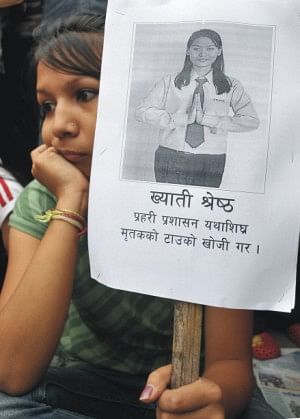<i>Spate of kidnappings shocks Nepal </i>

In this photograph taken on June 23, a friend of murdered kidnap victim Khyati Shrestha holds a placard urging police action during a protest rally in Kathmandu. The discovery this week of the 17-year-old schoolgirl's decapitated body has sent shockwaves through Nepal, where police say kidnapping for ransom is becoming a "cottage industry". Photo: AFP
The discovery this week of the decapitated body of a 17-year-old girl abducted in Kathmandu has sent shockwaves through Nepal, where police say kidnapping for ransom is becoming a "cottage industry".
High school student Khyati Shrestha was snatched on June 5 after an acquaintance lured her to the kidnapper's apartment.
Later that day, her father received a text message to say she had been kidnapped and demand a one-million-rupee (13,000-dollar) ransom for her return, although police now believe she had already been killed.
The incident has dominated newspaper front pages and alarmed residents in Nepal's capital, where kidnappings for ransom have become increasingly common in recent years as political instability and rampant corruption have led to growing insecurity.
It came weeks after a 10-year-old girl was snatched on her way to school in the capital and whisked away by armed men riding motorbikes, but later rescued by witnesses who chased down her kidnappers.
Police say they are making inroads into tracking down and prosecuting the criminal gangs behind such incidents but they concede that many cases go unreported because families prefer to pay the ransom.
"We are dealing with the problem. More than 90 per cent of the cases filed have been solved and we have been able to free the victim and arrest the kidnappers," said Sher Bahadur Basnet, who deals with kidnapping at the Nepal Police crime division.
"But we can only investigate what is reported to us. Many such cases may have gone unreported."
One Kathmandu businessman told AFP how he was kidnapped at gunpoint while walking home from his office in the capital three months ago, and only released three days later when his family paid a ransom of ten million rupees.
Like many victims, they decided not to inform the police, fearing later reprisals.

 For all latest news, follow The Daily Star's Google News channel.
For all latest news, follow The Daily Star's Google News channel. 



Comments